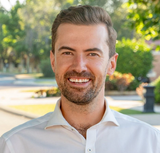The Light They Never Know
When people talk about dementia, they often remark on how difficult it is for those who witness the decline of a loved one - sometimes even more so than for the person experiencing it.
Enshrined in that thought is the idea that we, the witnesses, remember everything.
We hold the memories of what’s happening in all their detail, while the person slipping further & further away simply can’t recall it. We are left carrying the weight of those moments - their richness, their pain - and in that, we grieve.
My grandmother was recently misdiagnosed with Parkinson’s. The real cause turned out to be a condition where the nerves in her extremities are almost completely gone. It’s not degenerative, but for a brief few weeks we lived with the prospect that her body would deteriorate while her mind remained fully aware.
As a family, we found ourselves having frank conversations about which would be the crueller fate - for the body or the mind to go first. Universally, we said the mind. Because at least then we might be spared knowing exactly how bad it had become.
It strikes me now that there’s something in this that echoes raising a child.
A quiet ache.
A strange symmetry.
I feel it sometimes when I’m with my six-month-old son, Theodore - watching him smile so hard his whole body moves or reaching for me with tiny, determined hands.
These moments are seared into me.
They are the most luminous joy I have ever known. In a life that has, at times, been marked by what has felt like an intense darkness, Teddy is a light for me that doesn’t dim.
And yet - he will never remember this.
He will never know the power of what he has already given us. How much life he breathed into our family just by being here.
In much of Aboriginal tradition, we speak of life as a circle. That the spirit comes from the ancestors, carried to us through birth, and when we die, it returns to Country, joining the old people once again.
At both ends - the beginning and the end - there’s a kind of unawareness.
Babies don’t remember the light they bring; elders slipping away often don’t remember the light they leave. But those of us in the middle carry it. We witness it. We hold it for them.
And maybe that’s our role - to be the keepers of these moments.
To remember on their behalf.
To ensure the light is never lost, even if they never know it was theirs.
